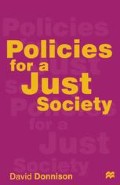Abstract
‘Poverty’ is the word most often used by pressure groups in Britain to describe the trends they deplore. That leads them to say that large and growing numbers of our people are poor. But these words are not much used in this country — and least of all by poor people themselves. Most of our fellow citizens use them to describe extreme hardships, and many of them believe these are now to be found only in third world countries, so they pay no attention to the arguments of the pressure groups. It’s a dialogue of the deaf. Can we find words which will at least enable us to talk to each other about these issues?
Preview
Unable to display preview. Download preview PDF.
Notes
Peter Townsend, Poverty in the United Kingdom, Harmondsworth, Penguin, 1979.
Joanna Mack and Stewart Lansley, Poor Britain, London, George Allen & Unwin, 1985, p. 294.
Keith Joseph and Jonathan Sumption, Equality, London, John Murray, 1979, p. 27
Len Doyal and Ian Gough, A Theory of Human Need, London, Macmillan, 1991.
Joseph Rowntree Foundation, Inquiry into Income and Wealth, York, Joseph Rowntree Foundation, 1995, Chapter 3, vol. 2.
Department of Social Security, Households Below Average Income. A Statistical Analysis 1979–1991/92, London, HMSO, 1994.
Richard Wilkinson, Unfair Shares, Ilford, Barnardos, 1994.
Alissa Goodman and Steven Webb, The Distribution of UK Household Expenditure, 1979–92, London, Institute for Fiscal Studies, 1995
James Banks, Andrew Dilnot and Hamish Low, The Distribution of Wealth in the UK, London, Institute for Fiscal Studies, 1994.
John Hills (ed.), New Inequalities. The Changing Distribution of Income and Wealth in the United Kingdom, Cambridge, Cambridge University Press, 1996, p. 13.
John Ball and Mike Marland, Male Earnings Mobility in the Lifetime Labour Market Database, Working paper No. 1, London: Department of Social Security, 1996.
Stephen Jenkins, ‘Assessing income distribution trends: what lessons from the UK?’, Working Papers of the ESRC Research Centre on Micro-Social Change, Paper 95–19, Colchester, University of Essex.
John Hills, The Future of Welfare, York, Joseph Rowntree Foundation, 1993.
Employment Gazette, May 1994; Joseph Rowntree Foundation, Inquiry Into Income and Wealth, op. cit., vol. 1; Jenny Church and Carol Summerfield (eds) Social Focus on Ethnic Minorities, London, HMSO, 1996.
John Hills, The Future of Welfare, York, Joseph Rowntree Foundation, 1993, p. 26.
Copyright information
© 1998 David Donnison
About this chapter
Cite this chapter
Donnison, D. (1998). Hardship: Facts and Meanings. In: Policies for a Just Society. Palgrave, London. https://doi.org/10.1007/978-1-349-26058-4_1
Download citation
DOI: https://doi.org/10.1007/978-1-349-26058-4_1
Publisher Name: Palgrave, London
Print ISBN: 978-0-333-65645-7
Online ISBN: 978-1-349-26058-4
eBook Packages: Palgrave Social & Cultural Studies CollectionSocial Sciences (R0)

